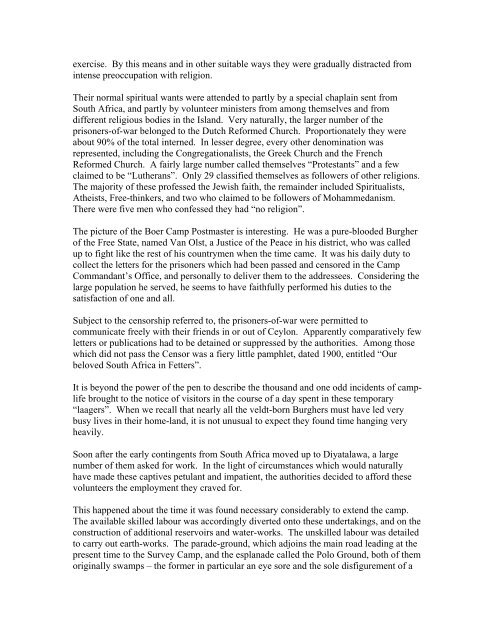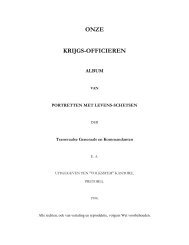Boere Krygsgevangenes in Ceylon - Boekmakierie.co.za
Boere Krygsgevangenes in Ceylon - Boekmakierie.co.za
Boere Krygsgevangenes in Ceylon - Boekmakierie.co.za
Create successful ePaper yourself
Turn your PDF publications into a flip-book with our unique Google optimized e-Paper software.
exercise. By this means and <strong>in</strong> other suitable ways they were gradually distracted from<br />
<strong>in</strong>tense preoccupation with religion.<br />
Their normal spiritual wants were attended to partly by a special chapla<strong>in</strong> sent from<br />
South Africa, and partly by volunteer m<strong>in</strong>isters from among themselves and from<br />
different religious bodies <strong>in</strong> the Island. Very naturally, the larger number of the<br />
prisoners-of-war belonged to the Dutch Reformed Church. Proportionately they were<br />
about 90% of the total <strong>in</strong>terned. In lesser degree, every other denom<strong>in</strong>ation was<br />
represented, <strong>in</strong>clud<strong>in</strong>g the Congregationalists, the Greek Church and the French<br />
Reformed Church. A fairly large number called themselves “Protestants” and a few<br />
claimed to be “Lutherans”. Only 29 classified themselves as followers of other religions.<br />
The majority of these professed the Jewish faith, the rema<strong>in</strong>der <strong>in</strong>cluded Spiritualists,<br />
Atheists, Free-th<strong>in</strong>kers, and two who claimed to be followers of Mohammedanism.<br />
There were five men who <strong>co</strong>nfessed they had “no religion”.<br />
The picture of the Boer Camp Postmaster is <strong>in</strong>terest<strong>in</strong>g. He was a pure-blooded Burgher<br />
of the Free State, named Van Olst, a Justice of the Peace <strong>in</strong> his district, who was called<br />
up to fight like the rest of his <strong>co</strong>untrymen when the time came. It was his daily duty to<br />
<strong>co</strong>llect the letters for the prisoners which had been passed and censored <strong>in</strong> the Camp<br />
Commandant’s Office, and personally to deliver them to the addressees. Consider<strong>in</strong>g the<br />
large population he served, he seems to have faithfully performed his duties to the<br />
satisfaction of one and all.<br />
Subject to the censorship referred to, the prisoners-of-war were permitted to<br />
<strong>co</strong>mmunicate freely with their friends <strong>in</strong> or out of <strong>Ceylon</strong>. Apparently <strong>co</strong>mparatively few<br />
letters or publications had to be deta<strong>in</strong>ed or suppressed by the authorities. Among those<br />
which did not pass the Censor was a fiery little pamphlet, dated 1900, entitled “Our<br />
beloved South Africa <strong>in</strong> Fetters”.<br />
It is beyond the power of the pen to describe the thousand and one odd <strong>in</strong>cidents of camplife<br />
brought to the notice of visitors <strong>in</strong> the <strong>co</strong>urse of a day spent <strong>in</strong> these temporary<br />
“laagers”. When we recall that nearly all the veldt-born Burghers must have led very<br />
busy lives <strong>in</strong> their home-land, it is not unusual to expect they found time hang<strong>in</strong>g very<br />
heavily.<br />
Soon after the early <strong>co</strong>nt<strong>in</strong>gents from South Africa moved up to Diyatalawa, a large<br />
number of them asked for work. In the light of circumstances which would naturally<br />
have made these captives petulant and impatient, the authorities decided to afford these<br />
volunteers the employment they craved for.<br />
This happened about the time it was found necessary <strong>co</strong>nsiderably to extend the camp.<br />
The available skilled labour was ac<strong>co</strong>rd<strong>in</strong>gly diverted onto these undertak<strong>in</strong>gs, and on the<br />
<strong>co</strong>nstruction of additional reservoirs and water-works. The unskilled labour was detailed<br />
to carry out earth-works. The parade-ground, which adjo<strong>in</strong>s the ma<strong>in</strong> road lead<strong>in</strong>g at the<br />
present time to the Survey Camp, and the esplanade called the Polo Ground, both of them<br />
orig<strong>in</strong>ally swamps – the former <strong>in</strong> particular an eye sore and the sole disfigurement of a





